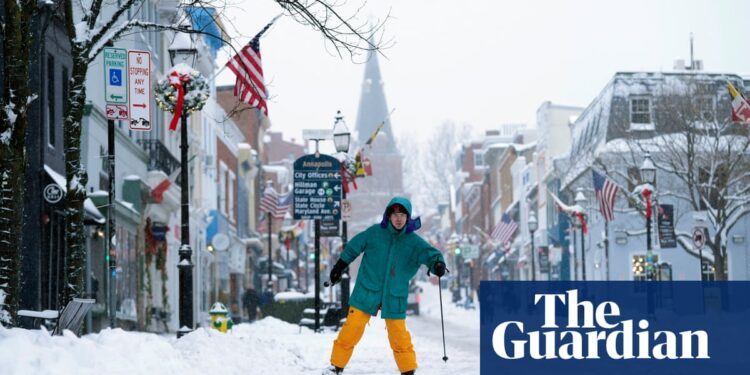The next round of bitter cold enveloped the southern US on Tuesday, after the first significant winter storm of the year blasted a huge swath of the country with ice, snow and wind as far south as Florida and Texas.
The immense storm system brought disruption over the weekend and on Monday to much of the mid-Atlantic region, triggering the announcement of states of emergency in several states. It even hit areas of the country that usually escape winter’s wrath, downing trees in some southern states, threatening a freeze in Florida and causing people in Dallas to dip deep into their wardrobes for hats and gloves.
On Tuesday morning, wind-chill temperatures dipped into the teens to the low 20s Fahrenheit (as cold as -10.5C) from Texas across the gulf coast, according to the National Weather Service.
A low-pressure system is then expected to form as soon as Wednesday near south Texas, bringing the potential of snow to parts of the state, including the Dallas area, as well as to Oklahoma, Arkansas and Louisiana.
A winter storm watch for Wednesday was issued for parts of north central and north-east Texas, and for Thursday for parts of Arkansas, Louisiana and Oklahoma.
The polar vortex that dipped south over the weekend kept much of the country east of the Rockies in its frigid grip on Monday, making many roads treacherous, forcing school closures, and causing widespread power outages and flight cancellations.
Ice and snow blanketed major roads in Kansas, western Nebraska and parts of Indiana, where the national guard was activated to help stranded motorists. The National Weather Service issued winter storm warnings for Kansas and Missouri, where blizzard conditions brought wind gusts of up to 45mph (72km/h) and multiple people were killed. The warnings extended to New Jersey into early Tuesday.
The polar vortex of ultra-cold air usually spins around the north pole, but it sometimes plunges south into the US, Europe and Asia. Studies show that a fast-warming Arctic is partly to blame for the increasing frequency of the polar vortex extending its grip.
The eastern two-thirds of the US dealt with bone-chilling cold and wind chills on Monday, with temperatures in some areas far below normal and a state of emergency was declared in several states, including Kansas, Missouri, Maryland, Kentucky, Virginia, West Virginia, Arkansas and Washington DC, as well as parts of New Jersey.
On Monday, Texas governor, Greg Abbott, also declared a state of emergency, activating emergency response resources ahead of the anticipated freezing temperatures and snowfall.
A cold weather advisory will take effect early on Tuesday across the gulf coast. In Texas’s capital of Austin and surrounding cities, wind-chill temperatures could drop as low as 15F ( -9.4C).
The north-east was expected to get several cold days.
Hundreds of car accidents were reported in Virginia, Indiana, Kansas and Kentucky, where a state trooper was treated for non-life-threatening injuries after his patrol car was hit.
Virginia state police responded to at least 430 crashes on Sunday and Monday, including one that was fatal. Police said other weather-related fatal accidents occurred on Sunday near Charleston, West Virginia, and Monday in Winston-Salem, North Carolina. Kansas saw two deadly crashes over the weekend.
More than 2,300 flights were canceled and at least 9,100 more were delayed nationwide as of Monday night, according to the tracking platform FlightAware. Ronald Reagan Washington national airport reported that about 58% of arrivals and 70% of departures had been canceled.
after newsletter promotion
As of Tuesday morning, at Ronald Reagan Washington national airport, 73 departing flights and 60 arriving flights had been canceled as of 11am ET.
The mid-Atlantic region had been forecast to get another 6-12in (15-30cm) of snow on Monday. Dangerously cold temperatures were expected to follow, with night-time lows falling into the single digits (below -12.7C) through the middle of the week across the central plains and into the Mississippi and Ohio valleys.
In north Texas, 3 to 6in of snow was expected late Wednesday night through Friday , according to the National Weather Service. Snow could also hit Oklahoma and Arkansas, with some parts potentially getting more than 4in (about 10cm).
School closings were widespread, with districts in Indiana, Virginia, Kentucky, Missouri and Kansas canceling or delaying the start of classes on Monday and some school districts, including in Missouri, Virginia, Ohio, Maryland, Washington, closed on Tuesday, too.
Many on Monday were in the dark as temperatures plunged. More than 218,000 customers were without power as of Monday night across Kentucky, Indiana, Virginia, West Virginia, Illinois, Missouri and North Carolina, according to the electric utility tracking website PowerOutage.us.
As of Tuesday morning, more than 170,000 customers were without power in Virginia, West Virginia, Kentucky, Indiana and Illinois.
In Virginia’s capital city, Richmond, a power outage caused a temporary malfunction in the water system, officials said on Monday afternoon.
Richmond officials asked those in the city of more than 200,000 people to refrain from drinking tap water or washing dishes without boiling the water first. The city also asked people to conserve their water, such as by taking shorter showers.
As of 9am ET Tuesday, the boil water advisory remained in effect, but Richmond officials said that the water plant systems were stabilizing and that it was likely to progress to water production by early afternoon.






